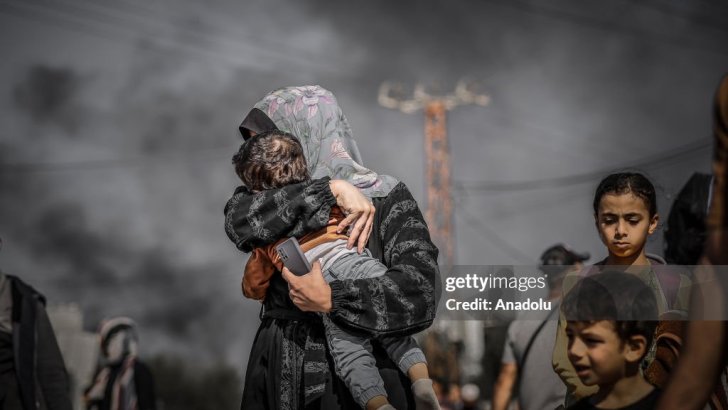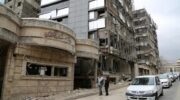Gaza City, Nov 10, 2024
Left without power or shelter, Palestinians are struggling to keep their children warm – at least five have frozen to death in the last two weeks
By Maha Hussaini in Gaza, occupied Palestine and Mohammed al-Hajjar, reposted from Middle East Eye, Dec. 30, 2024
A dewdrop fell from the roof of a tent on to Yahya Muhammed al-Batran’s nose, waking him to the news that his newborn son, one half of a pair of twin brothers, had frozen to death overnight on Sunday.
Originally from Beit Lahia in the northern Gaza Strip, Batran’s wife had given birth a month earlier. The children’s first home was a makeshift tent for the displaced, patched over with blankets, in Deir al-Balah in central Gaza.
The rudimentary protection from the winter cold and the lack of appropriate clothing meant the boys were at risk from the outset.
Recalling the discovery that his child had died, Batran said: “My wife was awake. I asked her what was wrong, and she pointed to Jumaa and shook her head.
“She said: ‘Ali seems half alive. But Jumaa, I’ve been trying to wake him for a while, and he won’t wake up.’
“She said that his head felt like ice. He was pale and completely lifeless.”
Batran wrapped his son in a blanket and rushed him to al-Aqsa Martyrs Hospital in Deir al-Balah.
“When I got there, the doctor said: ‘May God grant you patience; he’s dead.”
Batran’s remaining twin son remains in critical condition, as he also suffers from the effects of hyperthermia.
Israel has destroyed a vast majority of buildings in Gaza and has cut off fuel and electricity supplies to its residents.
More than 2.3 million Palestinians are huddled together in an increasingly small territory as Israel ethnically cleanses the northern half of the strip.
The Batran family’s experience reflects that of hundreds of thousands of others, forced from temporary home to temporary home as Israel carries out its campaign of killing and destruction.
In their case, there has been no respite from death.
“We came to central Gaza to protect ourselves and our children from the death we saw back in northern Gaza,” Batran told Middle East Eye.
“We were staying at a school in al-Maghazi, but after it was bombed, we fled to Deir al-Balah and stayed in a tent,” he added.
“Two of my nephews and three of my in-laws were martyred a few weeks ago. A week after my brothers’ sons were killed, God blessed me with twin boys.
“I named one after his uncle who was previously martyred, Jumaa, and the other after my nephew who was martyred recently, Ali.”
Jumaa and Ali were born prematurely at eight months but were in stable condition at the time.
Jumaa’s death takes the total number of children who have frozen to death in Gaza in the last fortnight to at least five.
They include Aisha al-Qassas, who was 21 days old; Ali Essam Saqr, who was 23 days old; Ali Hussam Azzam, who was four days old; Sila Mahmoud al-Fassih, who was 14 days old; and Jumaa al-Batran, who was one month old.
A sixth adult victim, a nurse named Ahmed al-Zaharna, was also found dead in his tent in Mawasi, Khan Younis, due to hypothermia.
Lack of postnatal care
As of September, more than 525,000 Palestinian women in Gaza have lost access to critical services, including prenatal and postnatal care, family planning and infection treatment, according to the United Nations Population Fund (UNFPA).
Of these, over 17,000 pregnant women are facing starvation, with almost 11,000 already suffering from severe food shortages as man-made famine threatens the most vulnerable.
“This lack of proper nutrition – combined with the immense stress of their situation – is leading to a rise in preterm births, low-birth-weight babies, and increased risks of stillbirths and developmental delays,” the UNFPA stated on its website.
Due to the limited capacity of hospitals and the overwhelming number of cases, the Batran twins were discharged from their incubator early, and their family was forced to take them back to their makeshift tent.
“I had no money to buy them clothes or blankets. Some neighbours donated a few clothes, but the twins needed something like a hospital incubator with nylon [for insulation] to keep them warm,” their father said.
“I couldn’t even afford to buy 4m of nylon. I swear to God, I would cover them with my only blanket and spend the entire night freezing,” he added.
“I went to Unrwa [the UN agency for Palestinian refugees], and they gave me a device that could be charged to keep the babies warm. But it could only work for three hours before needing to be recharged. I would use it for an hour and a half for each infant.”
To recharge the device, Batran would go to the hospital twice a day and use the electricity provided by its power generators.
But on the night Jumaa froze to death, the device had already lost charge from earlier use.
‘Verge of madness’
Since the start of its war on Gaza in October 2023, Israel has cut off electricity, severely restricted the entry of fuel and bombed much of the electricity infrastructure in the blockaded enclave.
As a result, Gaza’s residents are enduring a complete energy blackout that has lasted 14 months.
While solar power has helped some Palestinians generate energy, it has not been enough to meet their needs.
Dr Hani al-Faleet, a paediatric specialist at Nasser Hospital in Khan Younis, said there have been cases where children were close to death but managed to survive.
“The situation is deeply sad because it could have been prevented if there was proper heating, clothing, and nutrition available,” Faleet said.
“Extreme cold significantly impacts the body’s organ functions, disrupting the heart and circulatory system,” he added.
As cases of hypothermia increase and temperatures continue to drop in Gaza, parents have become increasingly paranoid about the risk of their children becoming the next victims of the cold.
In a post on the social media platform X, Nour, a Palestinian displaced mother in the central Gaza Strip, wrote: “I cannot sleep. In the suffocating darkness, I feel their breaths beneath their noses to ensure they haven’t frozen to death yet. I cannot sleep. I’m on the verge of madness”
In al-Zawaida in central Gaza, Hamed Ahmed, a father of three, pricks his newborn’s feet with a pin as she sleeps to ensure she still feels it.
“My tent is made of bits of nylon and fabric, set up near the sea. At night, the temperature drops so much that we adults shiver and freeze – imagine the children,” he told MEE.
“Normally, at the start of winter, we would shop for new clothes for the kids. But now, with three children, my wife and myself, we would need a massive budget to buy clothes.
“Today, a single pair of pyjamas costs 150-180 shekels ($40-50), and I’m unemployed now, so I didn’t buy them anything.”
For more than a year, Israel has severely restricted the entry of goods into Gaza, including winter clothes, with only limited supplies entering as part of international aid.
As a result, the central and southern Gaza Strip, currently home to around 2 million residents and displaced people, is facing a shortage of winter clothes and blankets.
If some items are brought by traders from northern Gaza, they are sold at more than triple their pre-war prices.
“After hearing about the children who have died from the cold, we cannot sleep at night as we keep checking to see if they are covered and warm.
“My wife and I take turns to stay awake to make sure our 22-day-old daughter is still alive.
“We feel her feet regularly to see if they are cold or warm.”
Maha Hussaini is an award-winning journalist and human rights activist based in Gaza. Maha started her journalism career by covering Israel’s military campaign on the Gaza Strip in July 2014. In 2020, she won the prestigious Martin Adler Prize for her work as a freelance journalist.




